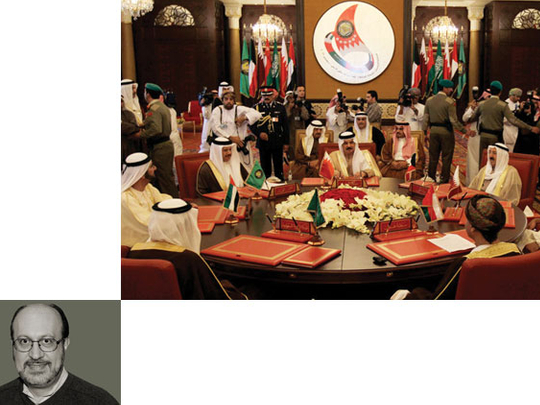
Once again, Gulf Cooperation Council (GCC) leaders held a summit to discuss burning issues and, once again, little of their decisions appeared to be relevant. Since 1981, and through 33 sessions of the GCC Supreme Council, along with countless meetings at a variety of ministerial and bureaucratic levels, security, political and economic issues were tackled. These included, inter alia, the regional threats posed by Iran and Iraq, domestic challenges, and terrorism. In fact, it would be safe to state that Arab Gulf rulers discussed and negotiated on every imaginable topic, concluding with the latest proposal to venture into a full-fledged union that, at least for now, was deemed premature. Over the years, and early hopes for genuine cooperation notwithstanding, the very purpose of the alliance — to ensure regional security — fell by the wayside. What prevented the Riyadh-based organisation from becoming an effective institution?
To be sure, the six conservative Arab Gulf monarchies that joined hands over three decades ago in what The Economist then labelled the “5+1” organisation, accomplished many notable goals.
As the most powerful member of the alliance, Saudi Arabia rallied its five partners around an embryonic collective defence force known as Dar’a Al Jazirah [Peninsula Shield] in 1984, though it rejected the 1991 Omani proposal to expand it into a 100,000-strong credible joint military body that could deter regional foes.
Ironically, while Peninsula Shield was barely activated in the aftermath of the 1990 Iraqi invasion of Kuwait, it was deployed to Bahrain in March 2011, ostensibly to bolster security during anti-government protests in the island-kingdom.
On the quest for economic cooperation, the GCC’s publicly declared purpose, a common market finally came into existence in 2008, though the much-heralded single currency was not introduced in 2010 as originally planned. A customs union was created in 2003 but, regrettably, it too made little progress since that time. A variety of socio-economic accords were signed, even if differences remained firmly entrenched.
Supra-nationalism
Thus, while GCC leaders recognised the challenges that confronted member-states correctly, no regional institutions or mechanisms were produced to gradually habituate citizens to set aside narrow patriotic pronouncements in favour of supra-nationalism. In other words, each GCC state advanced its own objectives, while the organisation’s potential was placed in abeyance. Against a plethora of challenges, cautious ruling families were literally overwhelmed, which remained constant for at least three decades.Indeed, little changed on GCC summit agendas over the years, as Iran, Iraq, Palestine and several core concerns dominated every discussion. Iran’s occupation of three UAE islands, the spillover effects of the Iranian Revolution, the Iran-Iraq War, Iran’s exploitation of regional circumstances to push its own agenda, Lebanon’s wars, the Yemen crises, Israeli attacks throughout the Occupied Territories, ongoing Arab uprisings, the Syrian Revolution, as well as military ties with Western powers with their own regional and international dynamics, among other issues, were all comprehensively debated.
Critical step
Yet, despite exhaustive efforts, the GCC was nowhere near its own objectives, victim to several lacking features. What prevented closer integration?
First, and unlike the European Union that grew out of the 1951 European Coal and Steel Community—itself meant to be “a first step in the federation of Europe” — the GCC started as a security alliance, not an economic unit. In other words, there was no initial vision for a genuine federation, even if the Saudi monarch recently introduced the idea of union—an immensely critical step.
Second, while the six founding members of the European Community [Belgium, France, Italy, Luxembourg, the Netherlands and West Germany] represented a vast array of socio-political opinion, devoted Europeanists like Jean Monnet and Robert Schuman planted valuable supra-national seeds. Beyond their Khalijih identities, few GCC thinkers articulated common goals, which were required to gradually transform the alliance into an integrated regional body.
Indeed, and no matter how unpalatable the idea may sound today, the success of the EU was directly tied to the leadership vision shared by its two core founding states, France and Germany, best articulated by Monnet and Konrad Adenauer. There were many others, of course, but much of whatever was accomplished in Europe was due to these two men who managed to rise above patriotism in favour of supra-nationalism.
Beyond annual ceremonial photo opportunities, the GCC’s relevance thus depended on an essential duopoly, both to avoid transforming the organisation into a perpetual debating society and, equally important, to finally set in motion the creation of an effective union.
Dr Joseph A. Kéchichian is the author Legal and Political Reforms in Saudi Arabia.











